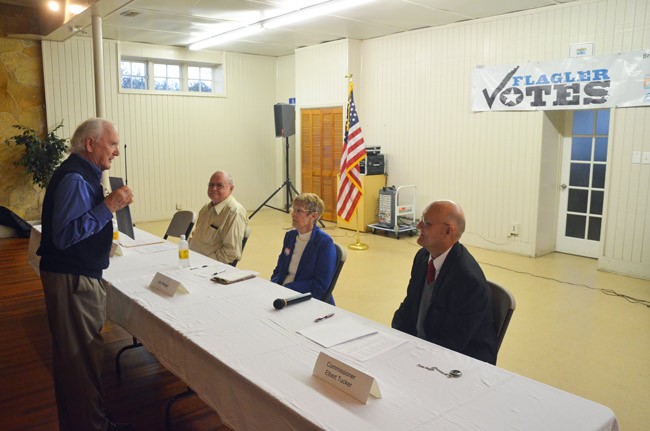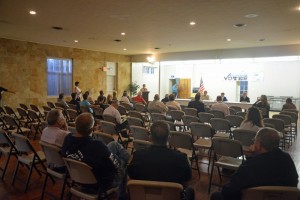
It’s an overcrowded election season. But the two cities that a couple of years ago commanded messier and more numerous headlines than their size warranted are now two oases of calm and electoral snooze. Flagler Beach and Bunnell each were to have an election in March, with two seats up on each commission. Flagler Beach filled its own without an election.
Two incumbents and one challenger are running for the two Bunnell seats, but with so much collegiality between the three candidates that you could almost mistake them for bridge buddies. Incumbents Bill Baxley and Elbert Tucker joined challenger Jan Reeger Monday evening at the old Bunnell City Hall for the city election’s only candidate forum ahead of the March 15 vote. There’s no question that the two incumbents very much want to keep their seats, and that Reeger wants to take one away from them. That aside, and the two men’s years on the commission—Tucker was elected in 2008, Baxley in 2013—there was not much to distinguish them from each other.
Even Mayor Catherine Robinson, who, unusually for a political forum, opened the proceedings with a brief welcome, said: “Any of these three candidates will do a good job for the city of Bunnell, so I’m very happy they’ve decided to run.” (The forum was also attended by most of the city’s top staff, including its new manager, Dan Davis, and its two other commissioners.) Robinson has not always thought as much about Baxley and Tucker, whose coalition, with Commissioner John Rogers, decisively took away Robinson’s control of the commission three years ago, which eventually led to the new coalition pushing out Armando Martinez, the former city manager. But Robinson then pivoted and worked hard to smooth over relations with her former opposition, effecting the change that transformed the Bunnell City Commission from a warring theater into a near-model of harmony, at least in outward appearances.
But it’s far from an inconsequential election: the direction of the commission may hinge on the outcome.
It’s not clear how Reeger, if she were to be elected, would align, but observers see her as potentially joining the two Robinsons on the commission—Catherine and Bonita—which would, in effect, shift power back to the mayor, and away from Tucker. Tucker had initially decided not to run, because he thought the mayor, too, was no longer going to run. It was only upon learning that Robinson would run again that Tucker opted to run for another term: for all the apparent harmony, he does not want his recent legacy overturned. That includes the erasing of a chronic budget deficit, restoring the city to fiscal health, and the maintenance of the city police department, albeit as a smaller force. Tucker had once favored turning policing to the sheriff’s office.
While Baxley and Tucker are running on their record, and as candidates who would preserve and continue what they’ve achieved—Baxley Monday evening repeatedly pointed to a reserve fund returned to health–Reeger herself is not running on a platform of change, nor is she proposing specific ideas, even when it comes to the one reason that pushed her to run: historic preservation. She was upset by the demolition of an old house on Moody Boulevard around Christmas last year. The house’s fate had been controversial for several years, with many city residents upset that the city or the county didn’t find a way to preserve it. But Baxley and Tucker were adamant then and now: historic preservation can’t be accomplished at the expense of property rights, nor must it be accomplished at the expense of taxpayers.
“Historic preservation comes with a dollar sign with it,” Tucker said last night. “Owning and disposing of a property is an issue for a property owner.” If anyone missed his point, he then added: “I’m not in favor of having to pay for preservation.” Baxley said he was “all in favor of keeping as many historic buildings” as possible, but not through ordinances that would create problems for the property owners. “You’ve got to be careful when you pass laws on this,” he said.

Three questions submitted by the audience dealt with the same code enforcement and property rights issues, each eliciting the same call for restraint and respect for property rights before policing, with one exception: Reeger termed herself “very disappointed” with the way the old county courthouse, briefly in the city’s ownership, was handed back to the county. But she did not explain how she would have kept the building in the city’s ownership, given the city’s financial difficulties at the time and the costs of repairing the building. Reeger in that and many other regards tried to differentiate herself from the incumbents, using words like “disappointed,” “disagreed” and “different,” but could not leap to defining her differences as opposed to making statements that merely implied an alternative approach.
The forum was moderated by Lea Stokes on behalf of the Flagler County Chamber of Commerce, the Flagler County Association of Realtors and the Flagler Home Builders Association, whose Flagler Votes initiative has been the county’s most consistent and accessible forum in elections large or small. Unlike previous forums, the questions on Monday mixed those from the chamber group with questions from the floor, written ahead of time on cards.
At one point candidates were asked about code enforcement, through a question that implied some criticism for the city being “reactive” rather than “pro-active” in the matter—meaning that the city waits until it is alerted to a problem before addressing it. But every candidate spoke candidly about wanting to maintain a reactive approach. “We do not need to have ordinances in Bunnell like they have in Palm Coast,” Baxley said, referring to Palm Coast’s heavy-handed policing of code enforcement. Tucker defended the current practice in Bunnell of responding to complaints from residents and not patrolling streets, Palm Coast-style, looking for violators. Reeger, too, seemed to agree. “We like some of the freedoms we have here,” she said, noting that there should be limits to those freedoms, such as garbage accumulating on a property.
They were also asked—as they always are—whether they would keep the police department or contract out the responsibility to the sheriff. Bunnell candidates usually don’t run on disbanding the police department, nor did these three candidates. Baxley is a law enforcement retiree, he said, and having local police is better than a sheriff’s deputy driving by every other day. Even Tucker, who twice explored contracting out policing, has reversed course.
They were also asked about the city’s business climate, but they could not—as city council members in any city generally cannot—provide the secret to landing new businesses. “Every city and town in America is trying to do the same thing we’re doing, trying to get business to come, and we are business friendly,” Tucker said. Reeger disagreed. As a Realtor, she said, she’d often heard Bunnell being business friendly. “Not so much, anymore,” she said. But none of the candidates provided a clear answer to an audience question about incentives for business.
As for commercial construction, which has been lagging in Bunnell—in contrast with Palm Coast—the candidates again were not able to provide a ready solution. “That’s a pie in the sky sort of thing,” Tucker said.
“I’m just not sure that reputation is out there,” Reeger said, speaking of greater efforts needed to help prospective businesses.
They were also asked about agriculture, State Road 100 becoming a business “destination” as opposed to a pass-through-road, and, toward the end of the meeting, in a question from the audience, whether they’d decriminalize the possession of small amounts marijuana. It’s not an esoteric question: the sheriff is urging the county commission to do just that, and Flagler’s cities would be asked to do likewise so there’d be a uniform approach to policing weed. Reeger’s answer was simple: “I agree.” Baxley, however, who appeared to have misunderstood the question (which, in fairness, was not written very clearly: it implied the full decriminalization of marijuana, not the limited scope the sheriff is seeking), said he agreed only for “strictly medical uses.”
Tucker’s answer was factually wrong. He said it was a moot point because the state pre-empts all marijuana laws. “We really don’t have a say in that,” he said.
That’s not correct, as counties—including Volusia, Palm Beach, Broward and Miami-Dade already have—are authorized to decriminalize the possession of pot in small amounts. What they are not authorized to do is impose stiffer penalties than the state does for such crimes or misdemeanors.
The forum was sparsely attended–perhaps 35 people at most–and included city employees and several elected officials, including county commissioners,m a school board member, and several candidates for local and congressional office.






























Jan Reeger says
As a citizen of Bunnell. I was disappointed and embarrassed about the Courthouse and City Hall decisions. The Commission begged for the Courthouse and got it. Then said they could not afford the million dollars to renovate it. I question that number. The Courthouse was unceremoniously given back. $600,000 was spent to purchase a 13,000 square foot building plus the cost of renovations. For comparable money they could have had the 50,000 square foot Courthouse and could be collecting rent for the space they did not use. The layout of the now City Hall is ineffective and the meeting room is the worst.